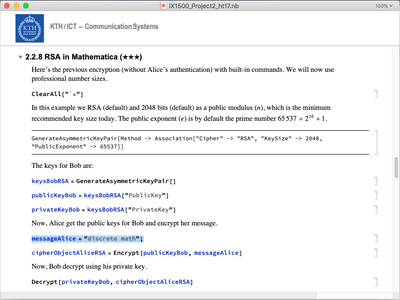Combinatorics, set theory and inclusion and exclusion, integer, divisibility, induction and recursion, functions and relations.
Introduction to groups, rings, bodies and the theorems of Fermat's and Euler's, the Chinese Remainder Theorem
Graph theory: isomorphic trees, walks and searches, Euler graphs, Hamilton graphs, planar graphs, colouring and chromatic number.
After passing the course, the student should be able to
- formulate, analyse and solve problems in discrete mathematics that is of importance in the area of information and communication technology
- apply and develop discrete models by means of a mathematical programming language
- critically review and comment a given solution to a problem
- comment a discrete model and suggest improvements
- present solutions to given discrete problems both orally and in writing in a mathematically correct way.
